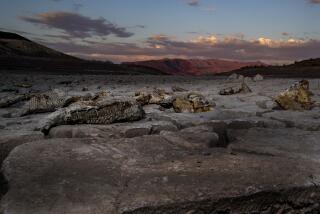Northwest -- sick of sunshine -- prepares to pull out the umbrellas
- Share via
SEATTLE — It’s been three months of almost unrelenting sunshine in the Pacific Northwest, day upon day of blue skies, balmy temperatures, barbecues that don’t have to be covered with tarps. What many are secretly thinking, but are almost afraid to say out loud: Thank heaven it’s almost over.
Seattle doesn’t do dry. And the line of weather systems now stacked up across the Pacific ready to land like enemy planes, starting Friday, is being quietly welcomed by a collaborating public tired of watering its gardens and of being all cheerful.
The National Weather Service says a record-breaking dry spell that imposed 80-degree temperatures and higher between July and September is about to be overcome by the unrelenting drizzle and gloom that characterize a proper Northwest late autumn. And none too soon.
“This is the blog I knew I would have to write eventually, and I suspect some of you will welcome it. Our supernaturally dry, warm period is going to end on Friday,” the Northwest’s premier weather guru, Clifford Mass of the University of Washington, wrote in a post that explored the psychological trauma Northwesterners experience when exposed to too much uninterrupted sunshine.
Mass says it’s seasonal affective disorder, and it’s not the kind everybody usually talks about: the depression Seattleites suffer when it’s June and still raining after nine months and people are sitting in coffee shops, thinking dark thoughts about serial killers in moss-bound forests and scanning the want ads for jobs in L.A.
No, this is the affliction that occurs when too much sunshine hits those who, frankly, just aren’t equipped to deal with it.
“We normally have about 225 cloudy days a year, which is pretty substantial, and that period is pretty hard. But the interesting thing is I have been getting a lot of emails and comments on my blog from people telling me they’re suffering from the incessant, unending sunny weather,” Mass told the Los Angeles Times.
He researched it, and found that this is not unusual for residents of northern climes, where people grow up thinking it’s supposed to be wet and depressing. Places like London -- well, when are Londoners ever happy about anything? -- also suffer these symptoms.
The statistics bore out Northwesterners’ vague sense of unease: “For many locations, July to September of 2012 will go down as the driest for the period of record,” the National Weather Service said in a bulletin Oct. 2.
Portland got 0.52 inch of rain, compared with the normal of 2.81 inches.
Seattle was dry throughout August except for 0.01 inch on Aug. 9, a trace on Aug. 21 and another one on Aug. 28.
There wasn’t much more in September. “That was our last little bit of rain,” National Weather Service meteorologist Art Gaebel said. “Typically, though, those months up here are the driest. Maybe not that dry.”
It wasn’t all made-up grief: Tinder-dry conditions fed serious rangeland fires across central and eastern Washington. The regions were choked with smoke through much of September, and there were similar problems in Idaho and Oregon.
The good news: It’s over.
Already, a brief layer of low clouds had moved in Tuesday morning. The high-pressure zone that has been keeping all the clouds at bay is stepping aside, and the rain is expected to start late Thursday night or Friday morning.
“We are going to see an extraordinary transition, like someone turned the faucet on in a big way,” Mass said. His forecasts show some mountain areas could get 2 to 5 inches of precipitation over the weekend.
“I mean, it’s going to get wet in a real way fast,” he said, “and it’s going to be pretty intense.”
ALSO:
Illinois man charged in Oklahoma plot to bomb churches
Dallas mom faces sentencing for gluing child’s hands to wall
Illegal immigration journalist avoids deportation over traffic stop
More to Read
Sign up for Essential California
The most important California stories and recommendations in your inbox every morning.
You may occasionally receive promotional content from the Los Angeles Times.










